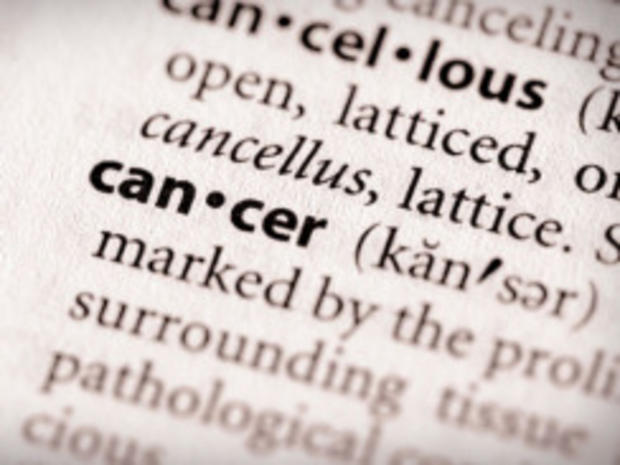More advanced "smart bomb" cancer treatments targeting disease, leaving healthy cells alone
(CBS/AP) CHICAGO - Cutting edge cancer research unveiled this weekend at the American Society of Clinical Oncology meeting in Chicago highlights a new class of "smart bomb" treatments that deliver powerful poisons directly to cancer cells while leaving healthy ones alone.
Global cancer cases projected to rise 75% by 2030
Scientists release childhood cancer genome data that could key treatments
Got cancer? 10 secrets for better decisions
The conference, attended by more than 30,000 cancer specialists, also released research by scientists on a new tool that helps the immune system attack a broad range of cancer types, treatments aimed at new genes and cancer pathways and better tests to predict which patients will benefit from them.
"I see major advances being made in big diseases" such as breast and prostate cancers, said Dr. Richard Pazdur, cancer drug chief at the federal Food and Drug Administration, which on Wednesday announced a new policy intended to speed breast cancer drugs to the market.
The field continues to move toward more precise treatments with fewer side effects and away from old-style chemotherapy that was "like dropping a bomb on the body," he said.
The smart bomb treatments are two-punch weapons that combine substances called antibodies, which bond with specific cancer cells, and toxins that are too potent to be given by themselves. A chemical link holds them together until they attach to a tumor cell, releasing the poison inside it and killing the cell.
"This is a classic example of the magic bullet concept" first proposed a century ago but only now possible with advances in technology, said Dr. Louis Weiner, director of Georgetown Lombardi Comprehensive Cancer Center.
"The antibody basically targets this very toxic drug right to the cancer cell and places it inside the cancer cell where the drug can do its damage" not harming nearby healthy cells, he said.
On Sunday, a large study showed that one such drug - Genentech's T-DM1 - delayed the time until cancer got worse in women with very advanced breast cancer. The drug also appeared to improve survival, although it will take more time to know for sure. So far, women on the new treatment were living more than a year longer than a comparison group of women who were given two other drugs.
T-DM1 also caused fewer side effects than the other drugs. Some women on T-DM1 had signs of liver damage and low levels of factors that help blood clot, but most did not have the usual problems of chemotherapy like hair loss, nausea and vomiting.
"It's less toxic than its comparator and also more effective," Dr. Clifford A. Hudis, a breast cancer specialist at the Memorial Sloan-Kettering Cancer Center who was not involved in the trial, told the New York Times. "How often do we get that?"
Dozens of similar "smart bomb" cancer drugs are in development. On Monday, Pfizer Inc. plans to report on one it is testing for certain types of lymphoma and leukemia. Only one such drug is on the market now for less common types of lymphoma, Adcetris from Seattle Genetics Inc.
The other big news at the conference involved a different approach, using the immune system to fight cancer. For more than a century, doctors have been trying to harness its power, but tumor cells have cloaking mechanisms that keep the immune system from recognizing them as "enemy" and attacking.
Bristol-Myers Squibb Co. has developed two drugs - one aimed at cancer cells and the other at key soldier cells of the immune system - to remove one of these invisibility cloaks. Two studies involving nearly 500 people found some tumor shrinkage in up to one quarter of patients with lung and kidney cancers as well as the deadly skin cancer, melanoma. The treatments had less impact against colon and prostate cancer.
These are only early results - not survival comparisons or definitive tests, doctors warn. More testing is needed to even establish safety. In one study, three patients died of a lung inflammation considered due to the treatment.
However, ordinary chemotherapy can prove fatal, too, said one study leader, Dr. Julie Brahmer of Johns Hopkins University.
"There were a few patients who had a complete remission" from the immune system treatments and most patients suffered few side effects, she said. "It's great to see patients feeling well. They don't have hair loss, they don't have a drop in blood counts and are not as prone to infections."
Dr. Roy Herbst, medical oncology chief at Yale Cancer Center in New Haven, Conn., was hopeful.
"I haven't seen anything this good" for many years for treating lung cancer, he said. "I'd be very surprised if there wasn't some benefit" on survival, said Herbst, who has consulted for the drug's maker.
Other doctors, including Pfizer's cancer drug development chief, Dr. Mace Rothenberg, noted progress on new diagnostic tests to predict which drugs will work for which patients. Cost, time and difficulty have kept many of them from being practical in everyday settings for cancer patients, but "a lot of these barriers are falling," Rothenberg said.
"Every time we say `this technology is 5 to 10 years off, we've been wrong" and progress has come sooner, he said.
More than 577,000 Americans will die of cancer in 2012, according to the National Cancer Institute, and more than 1.6 million people will be diagnosed.
The American Society of Clinical Oncology has more on cancer and findings from the 2012 ASCO Annual Meeting.

